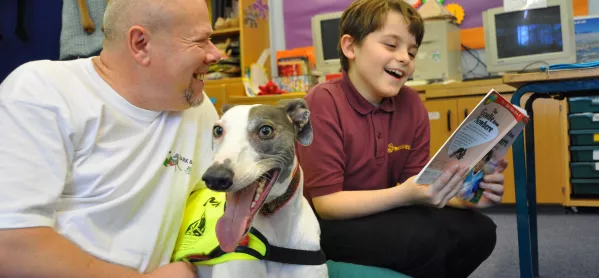The introduction of dogs in schools has grown in both awareness and popularity over recent years, something that is perhaps unsurprising given the many benefits that dogs bring, such as their companionship, calming influence and unconditional love.
However, just as with having a dog in your home, it is vital that thorough research and preparation has been carried out to ensure your school can provide a suitable environment for any dog that is brought in, and that their health and welfare is not compromised for the sake of having them in the classroom.
Bark and Read is an alliance of the nation’s largest dog therapy charities, with the aim to improve pupils’ literacy skills and confidence through encouraging them to read to specially-trained dogs. It is backed by the Kennel Club Educational Trust, and costs schools nothing to take part.
Long read: Why you’d be barking to dismiss school pets
Opinion: ‘We need more animals in our schools’
WATCH: The dog helping pupils through their exams
The programme facilitates having dogs in schools and enables them to benefit pupils, while ensuring this is done in a safe and responsible way, with the wellbeing of the dogs, as well as that of the students, considered at all times - and it lays out guidelines on this practice.
A dog’s life matters
We would be concerned to hear of schools where dogs roam freely without a lead, or where the dogs have not been trained or assessed for their role. While the positive impact on the pupils’ confidence is clear, the needs of the dogs must be carefully considered before embarking on any programme that brings them into schools.
Ad hoc use of unqualified and poorly supervised pet dogs in schools, fulfilling multiple roles, with no oversight or concern for the dog’s wellbeing, would not provide the range of benefits that the very practice of having dogs in schools aims for. Spending long days in schools, with no guidelines or a dedicated handler to supervise practice as set out in our own programme, can also be detrimental to the dog’s welfare.
Dogs can make wonderful reading companions, particularly for children struggling with confidence and self-esteem, because they don’t judge, and they don’t laugh or correct if a child makes a mistake. However, the dogs’ safety, comfort and enjoyment must also be catered for as the first and foremost priority, which will ultimately allow for a safe and rewarding experience for humans and canines alike.
We would encourage any school, teacher or volunteer who is interested in integrating dogs in schools to take a look at the Bark and Read standards of practice, which includes detailed guidance on what is required and how the programme works to benefit schools and pupils, with the welfare of the dog put first.
More information on Bark and Read can be found on the Kennel Club website.
Visitors to Crufts 2020, at the NEC Birmingham, can also speak to Bark and Read volunteers by visiting the Kennel Club Bark and Read stand, from from 5-8 March.
Ciara Farrell is Kennel Club library manager and spokesperson for the Bark and Read programme

